Hussam al-Mahmoud | Yamen Moghrabi | Khaled al-Jeratli
Over the past few days, a wave of disputes emerged within the Syrian opposition on more than one aspect, whether related to the mechanism of these institutions’ organizational and administrative work, or other aspects that were not detailed. At the same time, the repercussions of these disputes did not go unnoticed by public opinion.
While some involved in political work and observers doubt the opposition’s eligibility and weakness, expressing support for creating new structures, others believe that any new body will not receive support and that the current opposition represented by the National Coalition is a necessity imposed by potential developments to be a party in signing any possible settlement. This does not seem near with the international changes, shifting priorities, and the gradual normalization moves by Arab countries with the Syrian regime without guaranteed announced political change in line with related international resolutions such as Resolution 2254.
These disputes open the door to discussing the issue of the constant presence of certain figures as “faces” of the opposition, along with the absence of other personalities who were once active, and a series of successive losses that have reduced the international presence of the Syrian opposition and weakened serious engagement with them by other countries. This also opens the door to the discussion of “permanent positions,” and the strengths and weaknesses of the political bodies that emerged after the Syrian revolution carrying slogans to fulfill the legitimate aspirations and demands of the Syrian people.
Some believe that the problem of the opposition lies in its detachment from the street and its external affiliations, as well as the policy of “exchanging seats” to maintain certain faces in the leadership of opposition work, headed by a group known colloquially as “G4.”
These individuals argue that the opposition has “lost its popular base,” evidenced by the street’s stance towards it.
These details are discussed by Enab Baladi in this report, with a group of researchers and former and current members of the Syrian opposition bodies, along with a discussion on the future of the opposition politically, in light of regional and international changes affecting the Syrian file in one way or another.
Simultaneous disputes
In early September, representatives from the Cairo and Moscow platforms in the Syrian Negotiations Commission (SNC) and the Syrian Constitutional Committee (SCC) held a video meeting. The meeting included Qadri Jamil, head of the Moscow platform, Ahmed al-Jarba, the head of the Syria Tomorrow Movement, and coordinators and members of both platforms in the Negotiations Commission and the Constitutional Committee.
During the meeting, they discussed the latest political developments related to the Syrian situation, the work of the Negotiations Commission and the necessity of directing it to play its functional role in direct negotiations aimed at the full implementation of Security Council Resolution 2254. They agreed to continue meetings and coordinate subsequent steps, according to a brief press statement following the meeting.
A few days before this meeting, on August 28, the Cairo platform issued a statement after two previous Negotiations Commission meetings regarding amending the internal regulations and the duration of the Commission’s leadership.
The Cairo platform expressed reservations about the decisions made by the Commission in this context, seeing the amendment of the internal regulations based on a numerical majority as illegal and ignoring the pluralistic nature that formed the Commission based on Resolution 2254. They indicated that the amendment was adopted to keep some individuals in their positions for illegal periods.
The platform also considered that the recent exclusion of some political components from the Commission’s meetings and not inviting them to attend those meetings raises concerns that this approach is not just internal organization but paves the way for political steps that do not align with the aspirations of the Syrian people who pin their hopes on the Negotiations Commission to defend their rights and achieve their legitimate ambitions.
The platform, in its statement, called for ensuring the legitimacy of the Commission and not damaging any achievement that concerns the Syrian people alone and not harming the continuity of the Negotiations Commission’s work until the implementation of Resolution 2254.
The Negotiations Commission, after meetings held over two days, issued a statement on July 22 announcing the amendment of its internal regulations with the approval of the majority present representing all its components. This included amending membership conditions and increasing the specified duration for the leadership of the Commission to two years instead of one, extendable only once.
Under the title of discussing the Syrian reality and ways to overcome the challenges facing it, a group of Syrian opposition bodies and entities held a meeting hosted by Turkey on September 3. It was attended by the Syrian Interim Government (SIG), the National Coalition for Syrian Revolutionary and Opposition Forces (Syrian National Coalition), the Negotiations Commission, the Tribes and Clans Council, and leaders of the Syrian National Army (SNA).
Despite the participants’ emphasis on the “importance of continuing to hold meetings to discuss urgent problems and find appropriate solutions,” the subsequent events revealed a rift between some of the components that attended. On September 4, the Shamiya Front (one of the National Army components) announced suspending its work with the Interim Government due to a dispute with its head, Abdulrahman Mustafa.
The faction stated in a statement that it suspended its work with the Interim Government until a “wise government” is formed and called for an urgent meeting of the National Coalition to withdraw confidence from Abdulrahman Mustafa’s government and refer him to the judiciary.
The Shamiya Front’s statement directed a series of accusations at the head of the Interim Government, stating that Mustafa’s hostility towards it was known but was unprecedented during the recent meeting held in the Turkish city of Gaziantep.
The statement also noted that Mustafa directed a “torrent” of political and criminal accusations at the Shamiya Front, trying to “tarnish its image” in front of Turkish officials, threatening to withdraw legitimacy from it.
The faction considered that the accusations made by Mustafa against it serve “his personal interest,” adding that Mustafa described the opposition movement against his government in Azaz, northern Aleppo, as a “sabotage conspiracy” against his government and a “coup.”
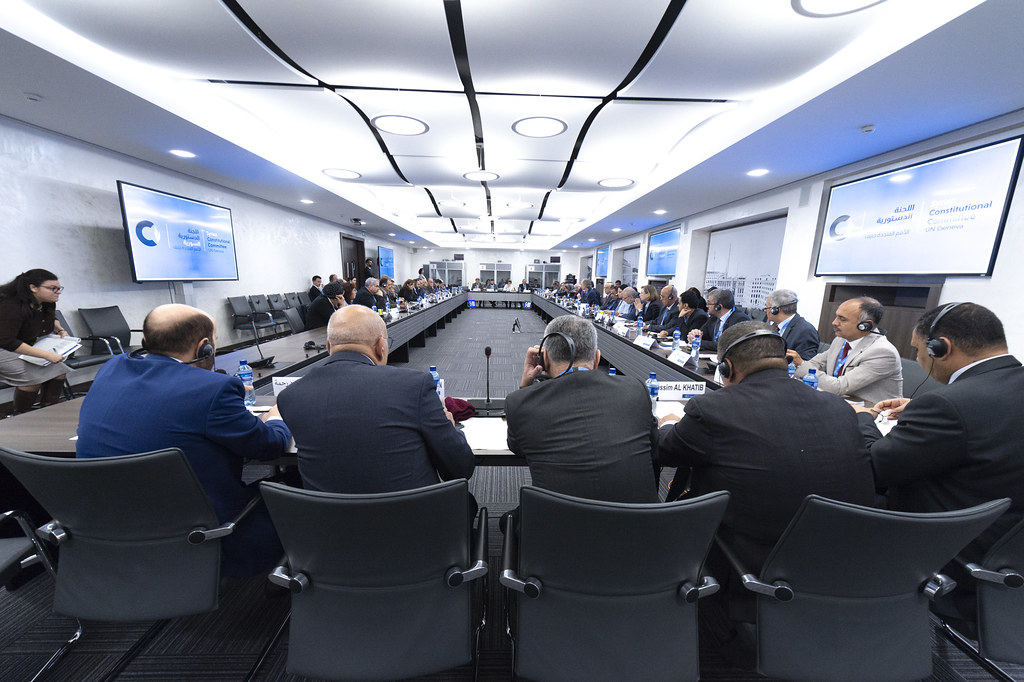
Meetings of the Syrian Constitutional Committee in Geneva – November 4, 2019 (United Nations/Violaine Martin)
Absent and present figures despite political failures
Since its formation in November 2012, the National Coalition for Syrian Revolutionary and Opposition Forces (also known as the Syrian National Coalition) has seen prominent political figures involved in the Syrian issue, such as George Sabra and Ahmed Moaz al-Khatib, but they later withdrew and suspended their political activity, with their current status resembling retirement, limited to media appearances through interviews, discussions, and commenting on some political issues via social media.
Simultaneously with these figures’ exit from the scene, the Coalition has maintained certain faces, following a policy of role exchange among the same players for the Coalition’s presidency. This transformed the largest opposition political body in terms of factions and parties into a closed political club with no space for new figures or young blood that could attempt to change the political reality of the complex Syrian issue or build new alliances after what the Coalition and Syrian opposition lost in allies and negotiation cards over the years.
Foundational rules and external control
The Syrian issue has reached a state of complexity and intertwining interests among active regional and international parties. It has become known that the parties holding and controlling the issue are not local, whether from the regime or the opposition side. More than a year ago, Arab countries announced their move towards normalizing political relations with the Syrian regime, met with statements of rejection and calls for retraction issued by the Coalition that had no impact on these countries’ political directions.
Despite a relative stalling in Arab rapprochement with the regime, the trend continues, with Saudi Arabia recently opening its embassy in Damascus and the regime resuming its presence at the Arab League around a year and a half ago.
Despite these rapid developments over the past two years, some political figures remained absent, adhering to a policy of self-distancing without resolving existing disputes with current opposition politicians. The most that happened were weak rumors about some of them being prepared to form a political body alternative to the Coalition. The Coalition itself did not extend invitations to these figures under these conditions to return to work collectively, avoiding losses.
Former Coalition president Khaled Khoja explained to Enab Baladi that the absence of previous Coalition leaders is linked to the foundational rules of the Coalition at its inception, stipulating position rotation and limiting extensions for the president of this political body to two terms, each six months. Still, the main reason is international intervention in designing the internal structure of the Coalition to suit the direction of the US administration under former President Barack Obama to float the regime and not enable the opposition in its established form, reflecting the composition of Syrian society dominated by a majority of “Sunni Arabs,” according to Khoja.
According to Khoja, a politician does not retire from work, but the reasons for the resignation of those leaders and figures remain and are exacerbating. Furthermore, communication between these former leaders and those striving to achieve the revolution’s goals within and outside Syria continues despite the regional and international weight to legitimize the regime and twist the opposition’s arm to suit that legitimacy.
Since the establishment of the Coalition in 2012, it has had 11 presidents, starting with Ahmed Moaz al-Khatib, who participated in the Arab Summit on March 26, 2013, and delivered a speech on behalf of the Syrian people. This was the only appearance of a Coalition president at Arab League meetings, whereas the current president of the Coalition is Hadi al-Bahra.
Former Syrian National Coalition president Nasr al-Hariri told Enab Baladi that the current leadership withdrew from politics, which it did not master on the ground, surrendered itself and its decisions to others, and hence, it is excluded from political arrangements related to Syria’s future.
He added that if the current opposition figures are incapable of moving or making decisive decisions that serve Syria, there is an urgent need to renew blood at the level of leaders and members, especially if they do not want to recognize or solve the problem, or at least pave the way for more representative and belonging individuals.
Amid all the complexities of the Syrian issue, some political figures still carry on through two paths: either through their presence within political blocs and entities like the Coalition, including its president Hadi al-Bahra and Badr Jamous (head of the Negotiations Commission), or through voicing opinions and positions via their social media accounts like Ahmed Moaz al-Khatib, Burhan Ghalioun, and others.
It seems that the reasons for these figures’ absence are practically linked to their inability to move within the Syrian issue through the Coalition and its internal relations’ complications, in addition to its internal regulations, or due to the issue being tied to regional countries like Turkey and Iran, or international powers like the USA and Russia. Hence, these political figures have to build external relationships more than their domestic political ones with other parties.
According to al-Hariri, the current Syrian situation requires a radical change in the ranks of the opposition to become more effective and representative of Syrian demands. This necessarily means getting rid of dependency on external forces, working on unifying their ranks and political vision, and producing new leaders with competence and a future vision aligned with current challenges, focusing on building an inclusive national project that puts Syria’s interest above all else, in his opinion.
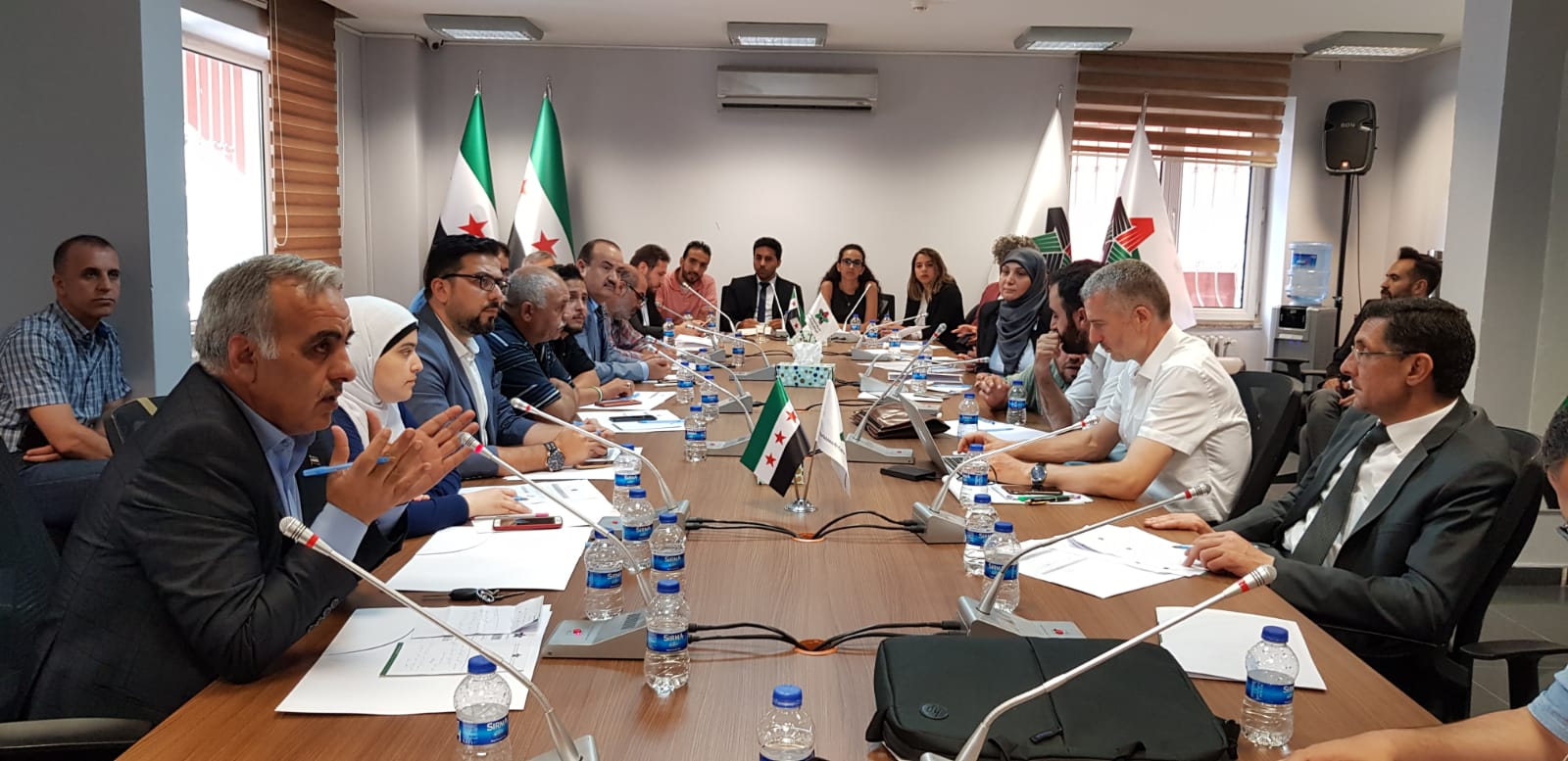
Workshop discussing the conditions of Syrian refugees in Turkey at the Syrian National Coalition headquarters in Istanbul – July 17, 2019 (Enab Baladi)
Absence of democracy and distance from Syrians
Despite the absence of some political figures from the Syrian scene, other politicians continue to work within the National Coalition, where almost every statement of their statements confirms “continuing work to achieve the demands of the Syrian people and their right to freedom and dignity.”
The Coalition, which verbally asserts its continued work to meet the aspirations of the public while its members practically remain in their positions, has not escaped the wrath of the Syrians. This is evidenced by sarcastic comments on social media and on the ground, when its institutions and affiliated figures were attacked in northwestern Syria by angry protesters in September 2023. At that time, protesters closed the Coalition office in the city of Azaz in the Aleppo countryside, as a form of rejection of this institution.
A leading source in the Coalition, who requested anonymity, told Enab Baladi that members of the main political body of the Syrian opposition are convinced that they do not represent the Syrians and believe there is no benefit in continuing their work in the Coalition.
The source explained that the members’ view of the Coalition portrays it as their parliament, and they have no fears about forming a new political body because the international community, under the current circumstances, will not recognize it. They also know that they are far from the Syrians and their hopes.
According to the source, these members do not want a political solution in Syria as it would come at their expense, especially with the stalling of a political solution and the cessation of battles, along with the disbelief that Bashar al-Assad will leave power in Syria any time soon.
The same source sees that the Coalition lacks a democratic culture, and the members are keen to stay in it without any material or political benefits, at least for now. Previously proposed suggestions to limit each member’s term as a way to rotate seats and inject new blood were rejected.
Former members of the Coalition previously criticized the voting method in its elections, specifically the so-called “delegation mechanism,” which stipulates the election of ten members as representatives for about 77 members.
The recent elections for the Coalition, in September 2023, were marred by accusations of fraud, threats, and coercion to elect Hadi al-Bahra as its president.
Abdullah Kaddo, a member of the Coalition’s political committee, told Enab Baladi that the Coalition was formed under difficult circumstances with the support of more than 100 countries, including major and active regional and international powers. However, Syria’s geopolitical peculiarity and countries’ interests, coupled with the limited experience of Syrian representatives in alliances and politics, which were suppressed by the Baath regime for nearly half a century, led to the failure to achieve what the Syrian people had aspired to over the past 13 years.
Kaddo did not deny that the opposition needs to improve self-factors by opening up to the broader Syrian populace, conducting a bold evaluation of its journey, renewing its methods, and activating its tools. He indicated that the Coalition includes representatives from most of Syria’s components, upholds the revolution’s slogans, and adheres to international resolutions regarding the Syrian issue.
Kaddo does not believe that accusations against the Coalition regarding its failure to manage the Syrian file are necessarily accurate, considering that no Syrian opposition component has escaped similar accusations. He noted that more than half of its current members are not founders, a situation not seen in other Syrian institutions and parties.
Kaddo believes that success and progress in the political process depend on both objective and subjective factors, not just the quality and seniority of the opposition leadership members. In contrast, former Coalition president Nasr al-Hariri believes the problem lies in the Coalition’s dependence on politically unstable countries without clear and effective strategies for the Syrian issue. The relationship between the opposition and these countries should be based on mutual benefit.
The Coalition oversees three institutions operating in Syrian internal affairs: the Interim Government, the Supreme Hajj Committee, and the National Olympic Committee.
Strengths and weaknesses, The need for change
The Syrian opposition today exists on the ruins of a political structure formed in the past due to international circumstances prioritizing the Syrian file. However, as this interest has gradually waned, influenced by the emergence of new international crises of higher priority for influential countries, the opposition no longer has a tangible political presence. It is also unclear if it is striving to restore this presence.
The opposition institutions today, after more than a decade of political changes affecting the Syrian file, suffer from multiple weaknesses, most notably the decline in international recognition and engagement. Many countries that formerly recognized these institutions have reduced their dealings with them to the extent that meetings with opposition leaders are now conducted with fourth-tier foreign ministry staff of these countries.
Hadi al-Bahra, current president of the Syrian National Coalition, stated in a previous interview with Enab Baladi that one of the main problems facing the opposition today is the emergence of more urgent and important international issues than the Syrian issue.
He added that the Coalition is trying to make Syria a priority again for influential countries, but this effort has not yielded results even after a year of attempts.
Samir al-Abdullah, director of policy analysis at the Harmoon Center for Contemporary Studies, believes that the opposition’s weaknesses are not limited to the international interest in the Syrian file but are rooted mainly in the loss of public trust.
Al-Abdullah told Enab Baladi that this trust deficit deepened due to what were dubbed “theatrics” witnessed by the opposition in recent years, such as leadership changes without real reforms, described as “seat exchanges.”
The extension of opposition leaders’ terms has eroded its popular base, leading to internal system amendments to achieve this, coupled with the absence of national figures, according to the researcher.
Al-Abdullah believes these factors have undermined the Syrian public’s trust in these institutions, which are now viewed as part of the problem rather than part of the solution.
The Syrian file needs opposition representatives
Despite recurring issues within Syrian opposition institutions, the main strength or reason for their continued existence is the international need for a representative of the Syrian opposition, according to researcher Samir al-Abdullah.
The researcher argues that influential countries in the Syrian file need an entity capable of signing agreements concerning Syria. Hence, these institutions remain even if their effectiveness is limited.
Syrian opposition politician Fayez Sara wrote in an opinion piece for Asharq Al-Awsat that the main opposition framework includes figures from the Coalition and groups close to it, most notably the High Negotiations Commission, the Constitutional Committee, and the Astana Group.
He added that most of those who exchanged roles in the opposition leadership since the formation of the National Coalition in 2012 have connections with the Syrian file managers in the intervening countries, especially Turkey, the United States, Russia, and some European and Arab countries. It is also known that most independent members have similar links and aspire to play a leading role in the next phase, according to Sara.
Regardless of what is said about the majority seeking to cling to their positions and roles and work to remain in decision-making centers, Sara emphasized the importance of noting changing alliances within the Coalition and its close formations, along with their relations with what he called “Islamic shadow formations.” He highlighted that their collective leadership experiences over the past years have not resulted in significant outcomes, citing Astana and the Constitutional Committee, which they have maintained for years under various pretexts and claims.
Sara concluded by saying that no opposition anywhere in the world since the end of World War II, no matter how strong, has been able to change or overthrow a regime in any country without the help of neighboring or friendly countries. “How much more so if the opposition is plagued by weaknesses, destruction, and diseases like the Syrian opposition?”
Losing achievements
The reasons for the opposition institutions’ loss of their early achievements are not solely linked to international political conditions and the changing mood of countries regarding the Syrian issue. They are also related to internal problems within these institutions, according to researcher Samir al-Abdullah.
The researcher stated that the opposition’s decline began with the Muslim Brotherhood’s prominent influence within its institutions, followed by the dominance of the “G4” group, leading to considerable loss of trust, especially on the international stage.
The “G4” refers to four key National Coalition members: Badr Jamous, Anas al-Abda, Abdul Ahad Astifo, and Hadi al-Bahra.
Today, the entities active in the Syrian file view the Syrian opposition as incapable of truly representing the people and their demands.
The researcher added that the primary problem of these institutions lies in two main points: the dominance of certain figures over these institutions and their continuation in their positions through term extensions or exchanging roles among themselves.
To maintain their positions, these opposition figures made significant concessions to their supporting countries, which has widened the gap between them and the Syrian public.
The second reason is the repeated internal amendments of these institutions’ systems serving personal interests of some figures, excluding many national figures.
Al-Abdullah believes that the solution is not in abolishing these institutions but in replacing all those in charge, amending their internal systems, and working from within Syria to represent the Syrian people’s will genuinely.
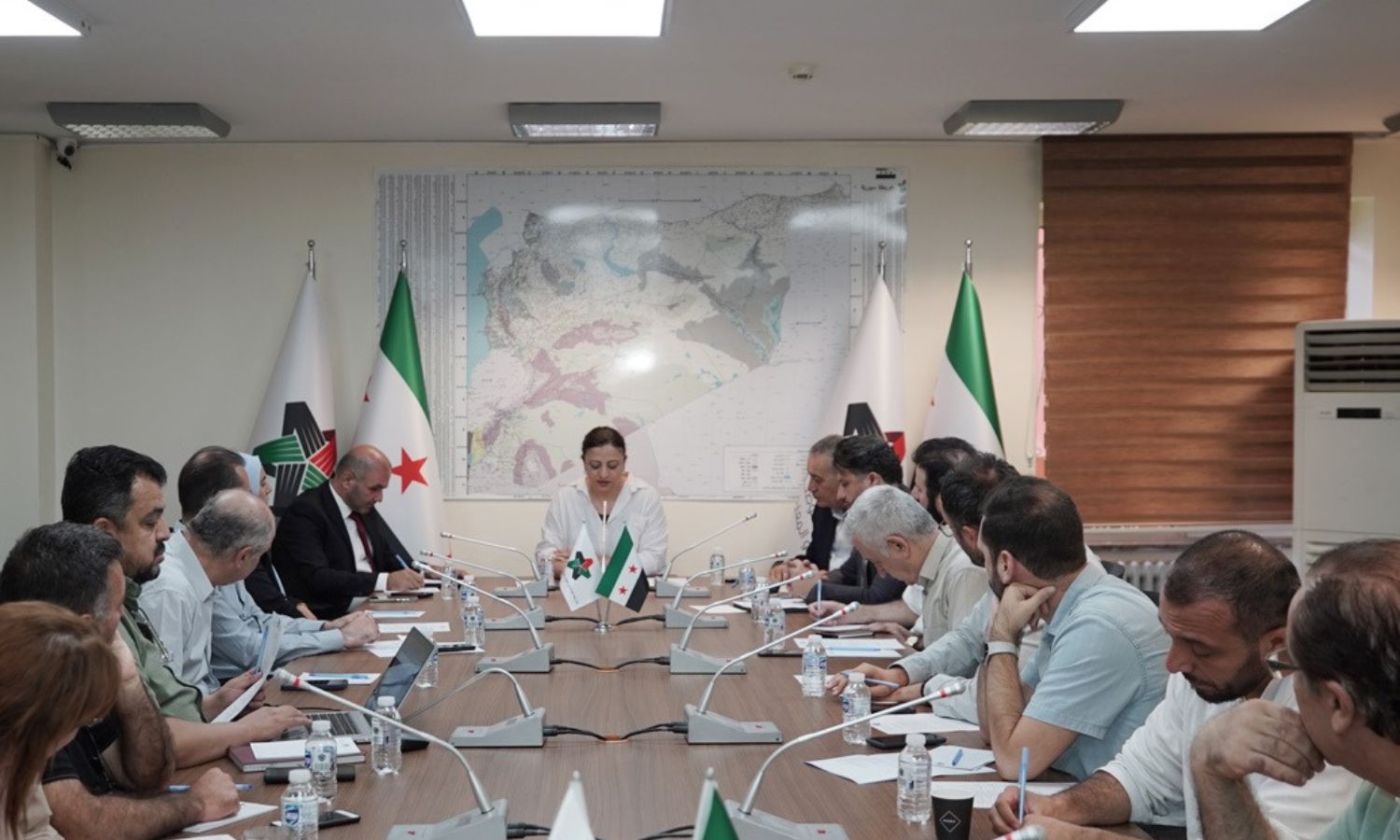
Meeting of Syrian National Coalition members with a Lebanese human rights team to discuss the conditions of Syrian detainees in Lebanon – August 2024 (Syrian National Coalition’s Facebook account)
Change is necessary
The disputes and differences within the opposition factions indicate the necessity of moving beyond the current structures, as they have become distant from the goals for which they were created, according to Dr. Hossam al-Hafez, head of the legal office in the High Negotiations Commission for 2016 and 2017, and a member of the Syrian opposition negotiation delegation for 2014.
These political structures have also surpassed many of the legal, political, and practical junctions that led to their creation, including the Coalition, Negotiations Commission, and Constitutional Committee, in which Syrians from the revolutionary and opposition side played no role in forming or accepting.
Speaking to Enab Baladi, al-Hafez does not agree that creating new political bodies might harm the representation of the revolution and opposition forces, as it reflects the development and awareness of the revolution and opposition. It is untenable to continue with political bodies that only represent themselves, even if they previously achieved some form of legitimacy, which has long since ceased to exist.
He continued that the bearers of these ideas and aspirations must be chosen through an innovative and new mechanism, with a survey of the political and semi-political bodies and agreement on a group of persons within a new executive and internal regulation reflecting the new compass. It is also possible to enlist a group known for their integrity, “whether those who distanced themselves or were distanced from the scene.”
It is essential to move beyond the current situation, and it cannot be assumed that these bodies have legitimacy; they do not, not only due to the level of disputes among them but also because they have no influence on the political and field events related to the Syrian file. They were sometimes tools in the hands of others to divert attention or confirm an unwelcome reality that does not serve the interests of the Syrians, according to al-Hafez.
if you think the article contain wrong information or you have additional details Send Correction
النسخة العربية من المقال
-
Follow us :












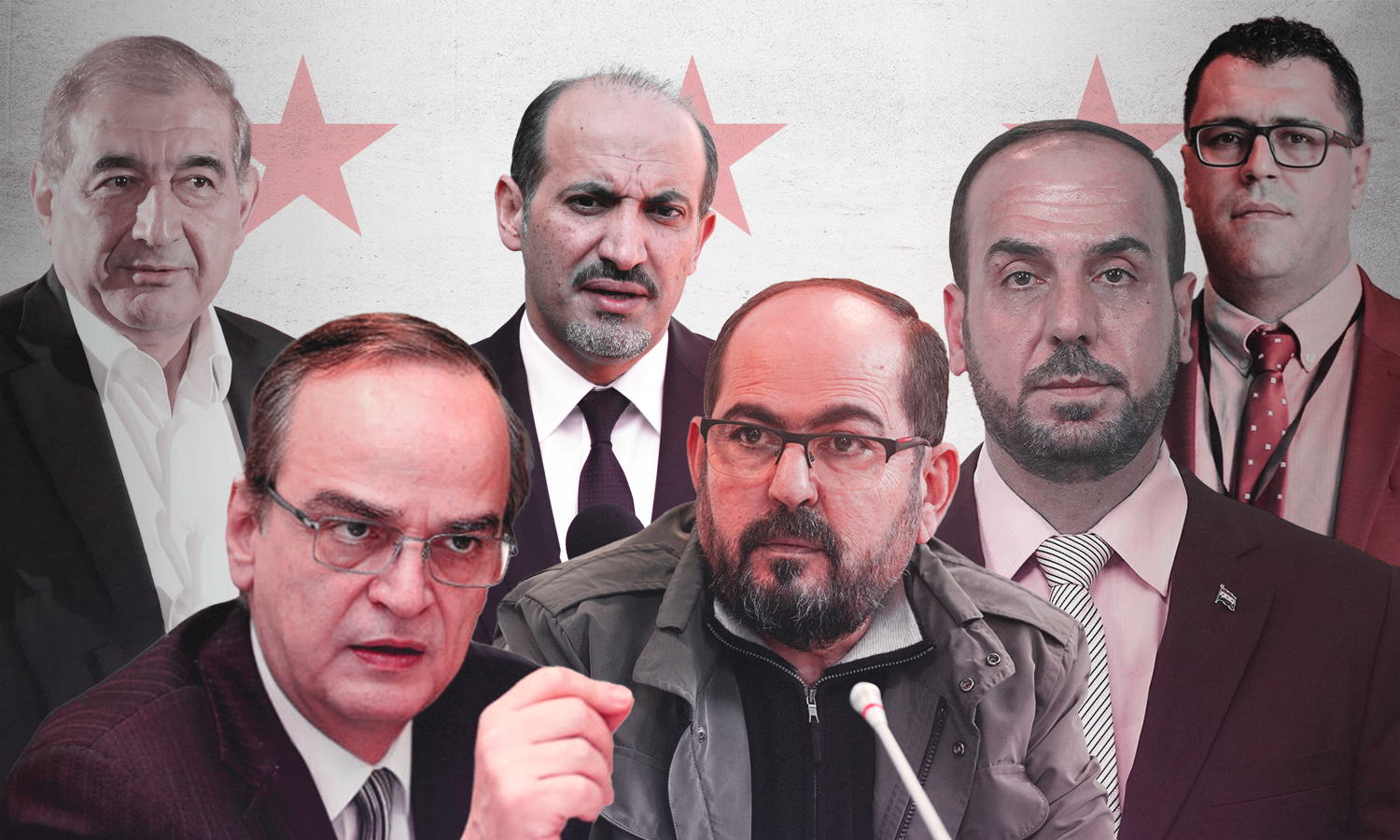
 Over the past few days, a wave of disputes emerged within the Syrian opposition on more than one aspect (Modified by Enab Baladi)
Over the past few days, a wave of disputes emerged within the Syrian opposition on more than one aspect (Modified by Enab Baladi)





 A
A
A
A
A
A
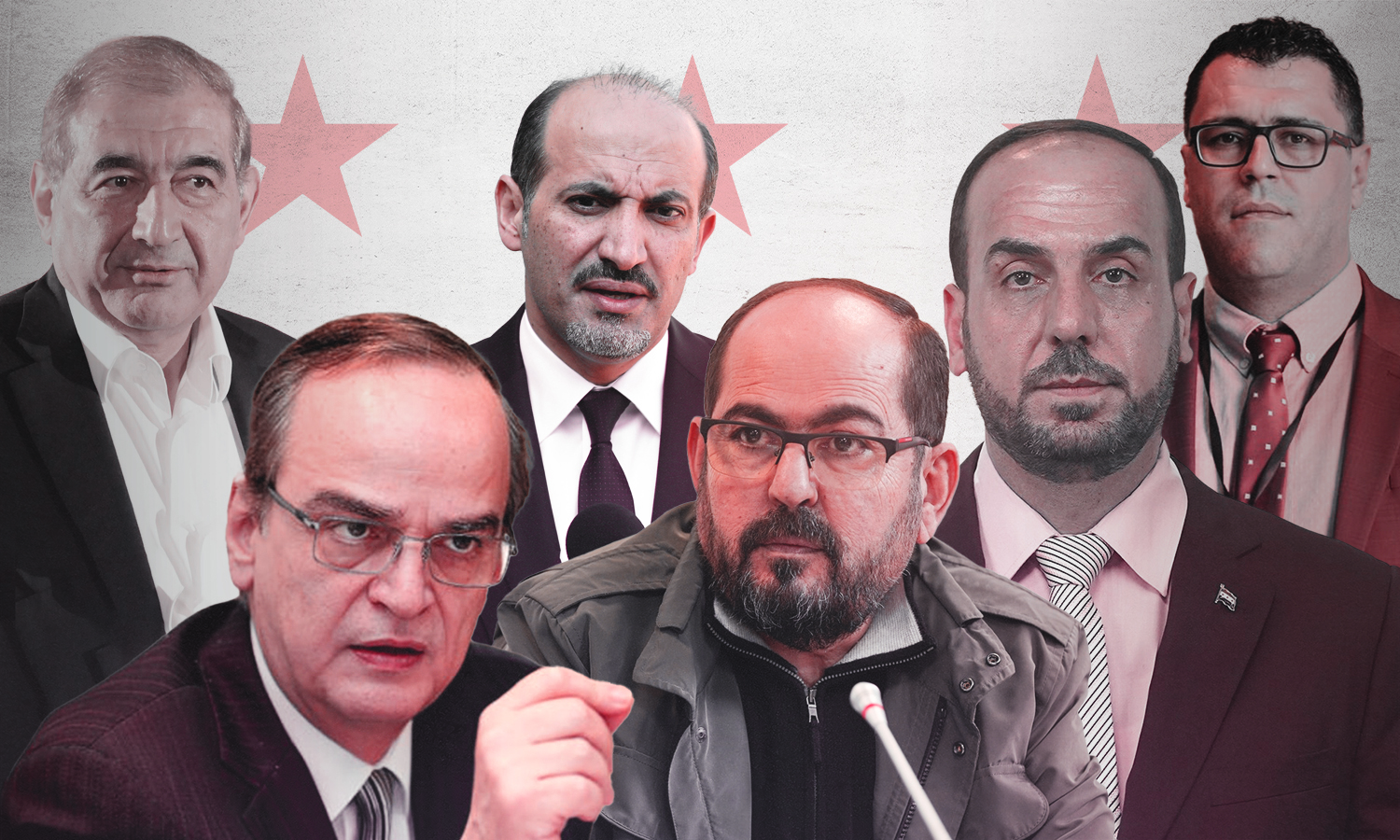







 More In-Depth
More In-Depth